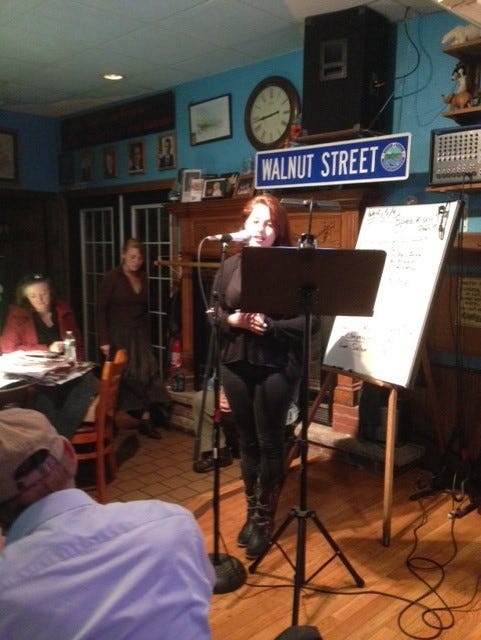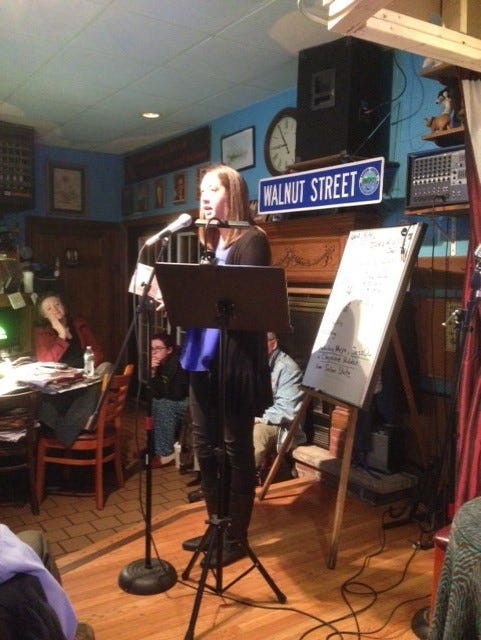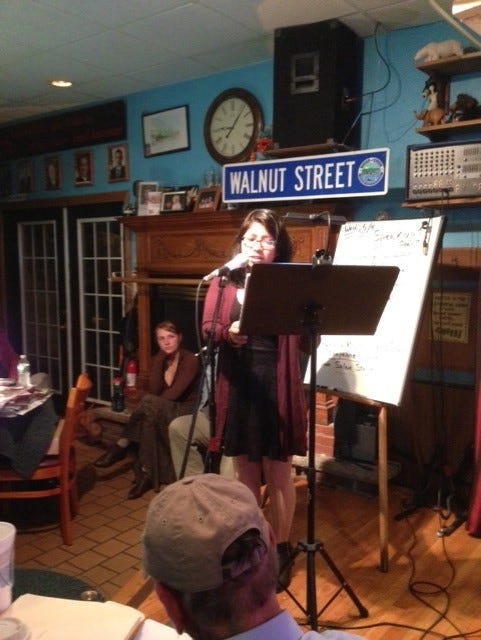Three SSU Students Take Center Stage
May 12, 2016 By: Joe McGurn
The Walnut Street Café in Lynn, Massachusetts has become the place for poets, fiction and non-fiction writers, and the occasional standup comic or musician to get together on Wednesday nights for “Open Mic” and to present their words or music to a welcoming audience. May 4th was no exception, however, three of the presenters, who were the featured writers for that evening, were Salem State University students, Jessica Olin, Cheyenne Hidden, and Fabiola Mejia, who were accompanied by their Salem State professors J.D. Scrimgeour and Kevin Carey.
The small, one-room café might be described as a “hole in the wall,” with a few scattered tables and chairs, a black leather couch large enough to accommodate three people, and high backless stools in the rear. In addition to coffee, the café offers wine, beer, soft drinks, and a few food items. The typical format at Walnut Street is to ask people to sign up early in the evening in order to present their poems, stories, etc. After about half of the open mic speakers have finished, the featured artists are introduced. They typically have 20 to 30 minutes to make their presentations.

The first Salem State student to take the stage was Jess Olin, who shared a moving essay about a marriage crumbling and the children who ultimately paid a price. Her story concerned her parents’ building of a new home in Groton, Massachusetts when she was a child. The home was filled with the newest appliances, tall windows, and a place that she described as “safe and warm” for her as a young girl. The house was symbolic, however, of her parents’ marriage, which over time went “downhill” and cost them both the loss of their home and each other. Jess stated later that the turmoil between her parents inflicted pain on her and her brother, and at times she felt as if she was the cause of the breakup. Her most poignant story occurred after the marriage ended and she and her brother visited her mother one Christmas. She and he brother were then living with their father. Her mother had very little to give them and was apologetic but Jess interrupted her mother’s apologies to say that Christmas was not about receiving gifts but about being together.

Cheyenne Hidden took the stage next and read a series of poems that were inspired by true stories. She read from her chapbook, Lost. The first poem was entitled “Argerdos,” meaning “suspects” in Portuguese. It concerned the disappearance of a three-year-old child while she and her parents were vacationing in Portugal. The second poem, “Cigarette Smoke,” concerned memories of her brother rolling cigarettes in his car while driving and then her remembrance of the smell of the cigarette smoke.
“Jingles” was a fanciful tale about her boyfriend’s cat and how she vacuumed it up into the hose of the vacuum cleaner. Cat owners beware! “Growing” was about her growth surges as an adolescent. “The Wait” was a striking poem about assault victims who fight with their attackers in an attempt to leave evidence, such as the attacker’s blood under their fingernails or on their clothes, for the ensuing police investigation. “The Swing my Father Built” concerned the swing that her father built by throwing a yellow rope over a tree limb.,a swing that not only provided her with fun, growing up, but proved worthy enough for a poem all its own. These poems could have been a part of a larger poem, but separately they were focused and caught the audience’s attention.

The final student presenter was Fabiola Mejia, who has already received acclaim and an academic award for her creative nonfiction story entitled La panadera, or The Bread-Maker. It is remarkable how such a mundane activity as making bread can define a life and enrich a story. Fabiola’s mother became a bread maker when she was only 14 years of age. Her father gave her a little bit of money to buy ingredients for bread and that was the start of her bread baking career which subsequently became a business. The descriptions of her mother and of her making kneading dough and baking bread were clear and one could see this small woman reaching up for two sacks of flour and then adding eggs, yeast, sugar, shortening and water to bake her special bread for El Dia de los Muertos, the Day of the Dead. The story about her mother is not really about bread, it is about the ceremony of making the bread. It is the remembrance of her mother’s brother Felipe for whom she lights three candles in the center of the dough. It is a remembrance of her mother becoming a baker in spite of her father thinking it “silly” that a woman should want to make money. Finally it is a story of the impoverished conditions in her mother’s village where some people were so poor that they could not afford to purchase the bread but bartered eggs or firewood for it. Over all, it is a remarkable set of stories told within the frame of her mother’s bread making.
Despite the pouring rain outside, the café was warm and filled with inspiration. Professors Scrimgeour and Carey were duly proud of their charges who, no doubt, have the skills to go on to the next level of academia or move on as writers. There was a throng a Salem State University students who applauded and voiced their approval for their fellow students. It was another successful night at Walnut Street Café, thanks to the trio of Salem State students, Jess Olin, Cheyenne Hidden, and Fabiola Mejia.
Contributor's Note: Joe McGurn joined Red Skies this semester.


